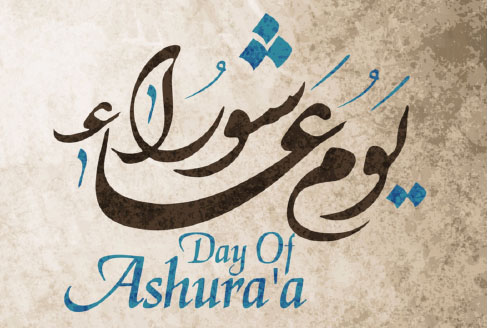
Ashura’ is an Islamic name that was not known at the time of Jahiliyyah. (Kashshaf al-Qina’), also known as Yawm Ashura or Tamkharit, is the tenth day of Muharram, the first month in the Islamic calendar. It marks the day that Hussain ibn Ali, the grandson of the Islamic prophet Muhammad, was martyred in the Battle of Karbala.
Ashura has become a national holiday, and many ethnic and religious communities participate in it.
Ibn Abbas said: “The Prophet (SAW) came to Madinah and saw Jews fasting on Ashura. He said, ‘What is this?’ They said, ‘This is a righteous day, it is the day when Allah saved the Children of Israel from their enemies, so Musa fasted on this day.’ He said, ‘We have more right to Musa than you,’ so he fasted on that day and commanded (the Muslims) to fast on that day.” (Bukhari)
Fasting on Ashura was a gradual step in the process of introducing fasting as a prescribed obligation in Islam. Fasting appeared in three forms. When the Messenger of Allah (peace be upon him) came to Madinah, he told the Muslims to fast on three days of every month and on the day of Ashura, then Allah made fasting obligatory when He said: “ … observing the fasting is prescribed for you … “ (Al-Qur’an, 2:183) The obligation was transferred from the fast of Ashura to the fast of Ramadan, and this is one of the proofs in the field of Usul Al-Fiqh that it is possible to abrogate a lighter duty in favor of a heavier duty.
Which Day is ‘Ashura’?
An-Nawawi (may Allah have mercy on him) said:
“’Ashura’ and Tasu’a’ are two elongated names [the vowels are elongated] as is stated in books on the Arabic language. Our companions said: ‘Ashura’ is the tenth day of Muharram and Tasu’a’ is the ninth day. This is our opinion, and that of the majority of scholars.
Ibn Qudamah (may Allah have mercy on him) said: “’Ashura’ is the tenth day of Muharram. This is the opinion of Sa’id ibn al-Musayyib and al-Hasan. It was what was reported by Ibn ‘Abbas, who said: ‘The Messenger of Allah (peace and blessings of Allah be upon him) commanded us to fast ‘Ashura’, the tenth day of Muharram.’ [Reported by at-Tirmidhi, who said, a sahih hasan hadith] It was reported that Ibn ‘Abbas said: ‘The ninth,’ and reported that the Prophet (peace and blessings of Allah be upon him) used to fast the ninth. [Reported by Muslim] ‘Ata’ reported that he said, ‘Fast the ninth and the tenth, and do not be like the Jews.’ If this is understood, we can say on this basis that it is mustahabb (encouraged) to fast on the ninth and the tenth, for that reason.
‘Abdullah ibn ‘Abbas (may Allah be pleased with them both) said: “When the Messenger of Allah (peace and blessings of Allah be upon him) fasted on ‘Ashura’ and commanded the Muslims to fast as well, they said, ‘O Messenger of Allah, it is a day that is venerated by the Jews and Christians.’ The Messenger of Allah (peace and blessings of Allah be upon him) said, ‘If I live to see the next year, in sha Allah, we will fast on the ninth day too.’ But it so happened that the Messenger of Allah (peace and blessings of Allah be upon him) passed away before the next year came.” [Reported by Muslim, 1916]
Ash-Shafi’i and his companions, Ahmad, Ishaq and others said: “It is Mustahabb to fast on both the ninth and tenth days, because the Prophet (peace and blessings of Allah be upon him) fasted on the tenth, and intended to fast on the ninth.”
The Virtues of Fasting ‘Ashura’
Ibn ‘Abbas (may Allah be pleased with them both) said:
“I never saw the Messenger of Allah (peace and blessings of Allah be upon him) so keen to fast any day and give it priority over any other than this day, the day of ‘Ashura’, and this month, meaning Ramadhan.”Reported by Al-Bukhari, 1867
The meaning of his being keen was that he intended to fast on that day in the hope of earning the reward for doing so. The Prophet (peace and blessings of Allah be upon him) said: “For fasting the day of ‘Ashura’, I hope that Allah will accept it as expiation for the year that went before.” [Reported by Muslim, 1976] This is from the bounty of Allah towards us: for fasting one day He gives us expiation for the sins of a whole year. And Allah is the Owner of Great Bounty.
Common innovations on Ashura
Commenting on things that some people do on Ashura, such as wearing kohl, taking a bath (ghusl), wearing henna, shaking hands with one another, cooking grains (Hubub), showing happiness and so on, Shaykh ul-Islam Ibn Taymiyyah said: “Nothing to that effect has been reported in any Sahih Hadith from the Prophet (peace be upon him) or from his companions. None of the Imams of the Muslims encouraged or recommended such things, neither the four Imams, nor any others.
WISHING ALL THE MUSLIM UMMA A HAPPY 1443 ISLAMIC NEW YEAR




